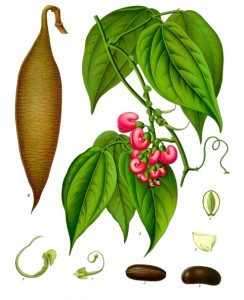Physostigma venenosum (the Calabar bean or ordeal bean) is the seed of a leguminous plant, a native of tropical Africa, poisonous to humans. It derives the first part of its scientific name from a curious beak-like appendage at the end of the stigma, in the centre of the flower; this appendage, though solid, was supposed to be hollow (hence the name from φῦσα, a bladder, and stigma).
Contents
Uses
Historically, African tribes used calabar bean, the “ordeal bean,” to identify witches and people possessed by evil spirits. They believed that people who were able to eat the bean and live were innocent. Subjects of the “ordeal” could increase their chance of survival by not chewing the bean but, instead, swallowing it whole. Chewing releases the poisons in the bean. Ritual uses continue in Africa despite being outlawed.
As medicine, Calabar bean is used for eye problems, constipation, epilepsy, cholera, and tetanus.
Calabar bean is a source of the prescription drug physostigmine (Isopto Eserine, Antilirium).
Cautions
Calabar bean is UNSAFE. It is extremely toxic.
Calabar bean can cause excessive saliva and sweating, reduced eye pupil size, nausea, vomiting, diarrhea, irregular heartbeat, blood pressure changes, confusion, seizures, coma, severe muscle weakness, paralysis, severe breathing problems, and death.
Special Precautions & Warnings:
While calabar bean isn’t safe for anyone, some people are at even greater risk for serious side effects. Be especially careful to avoid calabar bean if:
You are pregnant or breast-feeding.
You have Parkinson’s disease.
You have heart disease or slow heartbeat.
You have asthma.
You have diabetes.
You have poor blood circulation leading to tissue death (gangrene).
You have blockage of the intestinal tract.
Interactions
Drying medications (Anticholinergic drugs) interacts with CALABAR BEAN
Calabar bean contains chemicals that can affect the brain and heart. Some of these drying medications called anticholinergic drugs can also affect the brain and heart. But calabar bean works differently than drying medications. Calabar bean might decrease the effects of drying medications.
Some of these drying medications include atropine, scopolamine, and some medications used for allergies (antihistamines), and for depression (antidepressants).
Other names
Chop Nut, Esere Nut, Faba Calabarica, Fève de Calabar, Haba de Calabar, Haricot de l’Ordalie, Legume, Ordeal Bean, Physostigma, Calabar Bean
References
Source: Wikipedia, https://en.wikipedia.org/wiki/Physostigma_venenosum#Historical_uses

